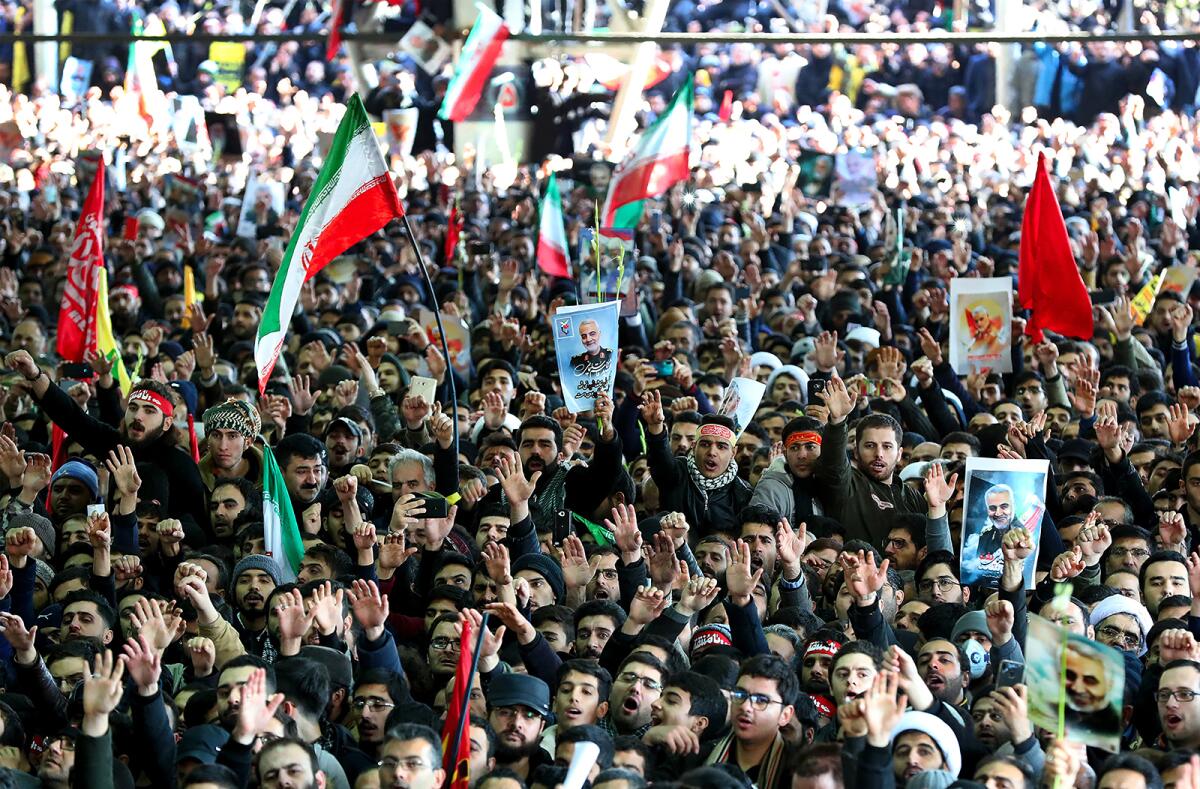How inevitable is war with Iran?

- Share via
Listening to experts, analysts and the 24/7 nonstop media in the days since President Trump ordered a drone strike on Iranian Gen. Qassem Suleimani, and now since Iran has launched ballistic missiles, one could be forgiven for concluding that we were on the brink of a sustained, major war with Iran.
As a longtime State Department analyst and negotiator specializing in the Middle East, I’m conditioned to assume the worst. The U.S. is without a doubt in for a tough time with Tehran. Sources close to Iran’s supreme leader, Ayatollah Ali Khamenei, told reporters he was demanding direct and open retaliation against American targets, and Wednesday morning in Tehran, Iran fired on American and coalition forces in Iraq. In the absence of a Tehran-Washington diplomatic off-ramp, it would be foolish to rule out uncontrolled escalation. Still, a major war is not yet inevitable.
So far in his presidency, Trump has been cautious when it comes to using military power against Iran, as his unwillingness to retaliate for the Iranian attacks against an American drone in June and Saudi oil facilities in September suggests. What prompted Trump to take out Suleimani is still not clear. News reports suggest he was angered by the attacks on the U.S. Embassy in Baghdad, worried that he’d allowed Tehran to think it could act with impunity and egged on by hard-liners like Secretary of State Michael R. Pompeo, who has been arguing for a military response for months.
Now, judging by Trump’s tweets, he’s prepared to retaliate militarily and directly if Tehran takes out Americans or American targets. Yet beyond acting as a momentary distraction from his impeachment trial, war with Iran is not to the president’s advantage.
Trump has only one strategic imperative in 2020, and that’s vindication in an impeachment trial and reelection. A messy, all-out — and if the past is any guide unwinnable — war that results in skyrocketing oil prices, a meltdown in financial markets, economic dislocation and a surge in U.S. deaths at Iranian hands will not help him at the ballot box. George W. Bush didn’t risk his political future by starting a war with Iraq after 9/11 because he was perceived to be responding to a major attack on the United States. Trump would be the perpetrator of war with Iran.
Like Trump, Khamenei in Tehran wants to stay in power. He’s a crafty leader committed to expanding Iran’s regional reach, but his main objective is survival of the Islamic Republic and regime maintenance.
Khamenei isn’t suicidal, and he knows that Iran has been seriously weakened economically by the Trump administration sanctions — the “maximum pressure campaign” — and by the recent massive protests inside Iran. More importantly, Iran’s generals know that in a military confrontation with the U.S., the preponderance of force rests with Washington. Khamenei cannot be sure how a sustained U.S. campaign of air, missile and cyber strikes would affect the stability of his government and his power base.
And yet, Khamenei has promised “severe revenge” for the killing of Suleimani. Trump’s tweeted red line doesn’t leave a lot of room for the Iranians to maneuver in. If Khamenei wants to avoid the risks of all-out war with the U.S., he must craft a response that demonstrates that Iran will not back down in the face of American military threats but that stays below the threshold that would trigger more U.S. strikes. However, unlike Iran’s previous carefully calibrated responses, Khamenei has made good on his threat to retaliate directly. An escalatory cycle may now begin.
It would be a boon to world stability if the Trump administration and the Islamic Republic stepped back from the brink and considered talking rather than taking more revenge. Unfortunately that’s not very likely. There’s just too much mistrust on both sides.
But there is at least a chance that the mutual fear and uncertainty of war will preempt a major conflict. Should the U.S. avoid a full-scale conflict with Iran over Suleimani’s killing, that does not mean his death comes at no cost. The drone attack on the second most powerful man in Iran and in a third country was an act untethered from any coherent, long-term strategy. The killing has not made Americans more secure or limited Iran’s regional influence. What it has done is cripple the U.S.-Iraqi relationship, strengthen Iran’s power in the region and undermine the fight against Islamic State.
The best Americans can hope for in the current crisis is a return to the grinding competition that has marked the relationship between Iran and the U.S. during the Trump years. Given the alternative of severe and sustained regional escalation, I’d take it in a Washington-Tehran minute.
Aaron David Miller is a senior fellow at the Carnegie Endowment for International Peace. He is author of the “End of Greatness: Why America Can’t Have (and Doesn’t Want) Another Great President.”
More to Read
Updates
4:48 p.m. Jan. 7, 2020: This op-ed article has been updated to reflect the launch of Iranian ballistic missiles at American forces in Iraq.
A cure for the common opinion
Get thought-provoking perspectives with our weekly newsletter.
You may occasionally receive promotional content from the Los Angeles Times.









